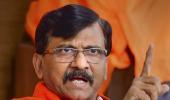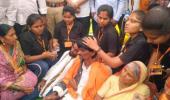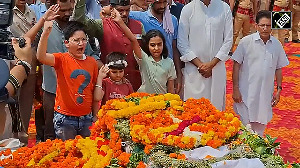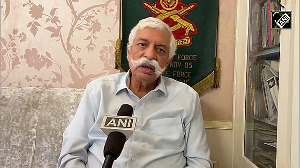The BJP cannot afford to alienate the OBCs, who have explicitly voiced their opposition to the Maratha quota.

Maharashtra's three-party coalition government, consisting of the Bharatiya Janata Party, the Shiv Sena led by Eknath Sambhaji Shinde, and the Ajit Anantrao Pawar-helmed Nationalist Congress Party faction, has secured an additional two months to address the long-standing demand for a reservation quota for the Maratha (Kshatriya or warrior) community.
However, this issue, which bobs up periodically regardless of the governing party or coalition in Maharashtra, is mired in problems arising from conflicting intra-caste identities, competing interests with other caste groups, political ambitions, and legal hurdles.
These factors, individually or combined, pose challenges to achieving a timely and smooth resolution, which escalated into violence in its most recent manifestation.
The latest episode concluded on November 2 when Maratha activist Manoj Jarange Patil ended his hunger strike, which began on October 25 in Antarwali Sarathi village in Jalna district, Marathwada.
Patil had initiated another phase of a fast-unto-death on August 29, which concluded with Chief Minister Eknath Shinde's intervention.
However, Patil had issued a 40-day ultimatum (ending on October 24) to fulfil the reservation demand by issuing an Other Backward Class (OBC) certificate to all Marathas, regardless of their sub-caste provenance.

The Marathas are not a homogeneous community.
In Marathwada and Vidarbha, they are classified as Kunbis (alternatively Kanbis or peasants/tillers) and considered OBCs.
In western Maharashtra, they are not grouped with the Kunbis, adding complexity to the issue.
If reservations are granted, it is more likely that the better-off sections will benefit rather than the impoverished peasantry, for whom agriculture is no longer a viable livelihood option.
Industry has not kept pace with the decline of agriculture in the hinterland.
Patil, unaffiliated with any political party, established an organisation called Shivba Sanghatana specifically to empower the Marathas.
However, he received support from the Maratha Kranti Morcha, an umbrella group advocating for the Maratha community's right to reservation.
The government's mediators included four ministers, two retired judges, an Independent MLA, and local Maratha leader Omprakash 'Bacchu' Babarao Kadu, who served as the CM's emissary.
The involvement of Kadu, along with Justices Maroti Ganpati Gaikwad and Sunil Balkrishna Shukre, reflected the "loss of credibility" suffered by all parties, including those in the Opposition, among the protesters, despite Shinde and Deputy CM Pawar being Marathas.
Shinde consistently expressed support for granting reservation to the Marathas.
Meanwhile, Maharashtra BJP President Chandrashekhar Krishnarao Bawankule emphasised, "The Maratha agitation is a sensitive issue, so it must be handled patiently."
Prakash Ambedkar, chief of the Vanchit Bahujan Aghadi, who occasionally aligns with the Opposition coalition, alleged that "the state with multiple political parties presents a vulnerable picture".
Ambedkar added that this is why "unorganised" groups have overshadowed mainstream parties.
The Marathas, primarily an agrarian caste with a historical association as a warrior caste due to their involvement in warfare, constitute nearly 33 per cent of Maharashtra's population, holding significant political influence.
They have contributed 12 of the 20 CMs the state has had since its establishment in 1960.
The first pro-reservation protest occurred 32 years ago, led by Annasaheb Patil, the Mathadi Kamgar Union leader, becoming an integral part of the state's political landscape.
In the pursuit of a solution, the Congress-led Prithviraj Chavan administration issued an ordinance in the past, setting aside 16 per cent reservation in government education and jobs for the Marathas, based on the recommendations of the Narayan Rane Committee.
In 2014, the government changed hands, with the BJP-Sena taking over under the leadership of Devendra G Fadnavis.
The Kopardi gangrape and murder of a minor Maratha girl in August 2016 served as a flashpoint for the Maratha Kranti Morcha and its associates to revive their protests between 2017 and 2018.
When the unrest escalated, Fadnavis attempted to calm tensions by allowing reservations under a special provision, the Socially and Educationally Backward Classes Act, 2018.
In 2019, the Bombay high court upheld the quota's constitutional validity.
However, in May 2021, a five-judge Constitution Bench of the Supreme Court invalidated the law, as it exceeded the 50 per cent quota cap stipulated by the court in the 1992 Indra Sawhney judgment.
In November 2022, following the Supreme Court's confirmation of the 10 per cent quota for the Economically Weaker Sections (EWS), the state government proposed that economically weaker sections of the Maratha community could benefit from the EWS quota until the Maratha issue was resolved. This gesture was declined.
The coalition government in Maharashtra, which ousted the Uddhav Thackeray-led Maha Vikas Aghadi through a series of political manoeuvres, first by splitting the Sena and then the NCP, faced challenges even before the reservation agitation.
While Fadnavis served as CM, he balanced the social contradictions in the electorate by reaching out to the Marathas and assiduously building a base among the OBCs, who constitute over 50 per cent of the population.
The BJP cannot afford to alienate the OBCs, who have explicitly voiced their opposition to the Maratha quota.
Shinde has secured an extension until January 2024 to address the procedural requirements allowing the government to issue Kunbi/OBC certificates to the Marathas, regardless of their origin.
Feature Presentation: Aslam Hunani/Rediff.com












